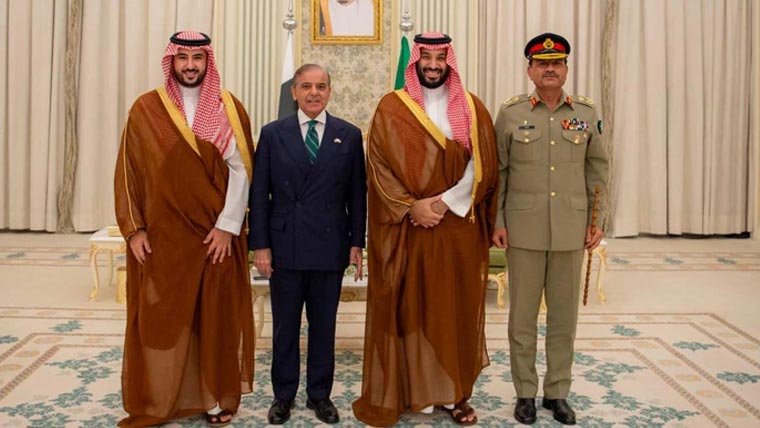Ahmed Raza
With Arab nations increasingly alarmed by Israel’s expanding aggression, the new defence pact between Saudi Arabia and Pakistan has injected fresh momentum into the region’s security architecture. Announced this week, the Strategic Mutual Defence Agreement effectively marries Riyadh’s immense resources with Pakistan’s nuclear-armed, battle-tested military. Analysts believe this partnership will reshape deterrence in the Middle East and South Asia at a time of heightened volatility.
Though few official details have been released, the pact’s significance lies in symbolism as much as substance. Pakistan’s nuclear doctrine has long been focused on deterring India, yet the agreement is widely perceived in Riyadh as offering a de facto nuclear umbrella. Israel, considered the region’s only nuclear power, will inevitably view this development with suspicion. For Saudi Arabia, the pact fills what it sees as a glaring strategic gap after Israel’s unprecedented strikes on Qatar last week.
Follow Republic Policy on YouTube
Defence Minister Khawaja Asif insisted that nuclear weapons were “not on the radar” of the agreement and stressed its defensive nature. “We have no intention of using this pact for any aggression,” he said. Yet a senior Saudi official hinted otherwise, describing it as a comprehensive arrangement “encompassing all military means.” This difference in tone reflects the sensitivities involved: Pakistan wants to reassure global powers, while Riyadh wants its people and adversaries to feel confident that deterrence has been secured.
The broader context is the erosion of trust in U.S. security guarantees. Washington’s reluctance to defend allies unconditionally, coupled with shifting American priorities, has forced Gulf monarchies to diversify partnerships. “From the Saudi perspective, it is intended to plug the deterrence deficit vis-à-vis nuclear-armed Israel,” argued Hasan Alhasan of the International Institute for Strategic Studies. This sentiment explains Riyadh’s move toward Islamabad, the only nuclear-armed Muslim nation.
Follow Republic Policy on Facebook
Pakistan, despite being one of Asia’s poorer states, maintains an army of more than 600,000 soldiers and has developed missiles capable of striking deep into India. In theory, those same systems could also reach Israel. Islamabad insists this capability is India-specific, but regional analysts note that Israel has always been uneasy about Pakistan’s arsenal. The new pact will amplify that discomfort.
Follow Republic Policy on TikTok
The pact comes with economic undercurrents as well. Pakistan struggles to match India’s defence budget, which is at least seven times larger. Saudi investment and financial support could help Pakistan modernise its military while stabilising its fragile economy. Prime Minister Shehbaz Sharif has already thanked Crown Prince Mohammed bin Salman for his commitment to expanding Saudi trade, investment, and business ties. For Islamabad, this is more than a security deal—it is also an economic lifeline.
Follow Republic Policy on Instagram
India and Iran have both taken note. New Delhi announced it would study the implications for regional stability, while Tehran remains wary of any expanded military cooperation between Riyadh and Islamabad. For Pakistan, however, the deal consolidates its long-standing pan-Islamist outlook and extends its strategic reach into the Gulf. For Saudi Arabia, it demonstrates independence from Western dictates, signalling to Israel and others that the kingdom is prepared to act decisively.
Follow Republic Policy on WhatsApp
Ultimately, the pact is less about nuclear weapons and more about credibility. It reassures Saudi Arabia of military backing in a crisis, and it elevates Pakistan’s status as a guarantor of Muslim security. By declaring that an attack on one will be treated as an attack on both, the agreement introduces a new deterrent framework in the region. It also underscores a shifting world order where Gulf states can no longer rely solely on U.S. protection.
For Pakistan, the gains are twofold: strategic relevance beyond South Asia and potential Saudi capital to shore up a struggling economy. For Saudi Arabia, it offers the reassurance of a nuclear-armed partner at a time when regional threats are multiplying. The pact may not amount to an Islamic NATO, but it is the boldest step in decades toward a collective Muslim defence arrangement. Its success will depend on sincerity, implementation, and the ability of both nations to balance global sensitivities with regional ambitions.
















